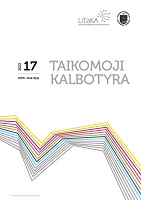An Empirical Study of Near-synonym Choice: A Comparison of Advanced EFL Learners to L1 English Speakers
An Empirical Study of Near-synonym Choice: A Comparison of Advanced EFL Learners to L1 English Speakers
Author(s): Alina YevchukSubject(s): Foreign languages learning, Lexis, Semantics, Language acquisition
Published by: Vilniaus Universiteto Leidykla
Keywords: near-synonyms; synonymy; lexical choices; EFL learners; TEFL;
Summary/Abstract: Near-synonyms are words which share certain semantic similarities, yet differ in their contextual usage (e.g. acquire vs obtain, evaluate vs judge). The current study compares lexical preferences and rationalizations for choosing near-synonyms of advanced C1 level non-native speakers of English (n = 45) to those given by native speakers of English (n = 58). The data has been collected using a forced-choice questionnaire which also included a justification section meant to explore respondents’ reasoning behind their lexical choices. The findings of the study suggest that EFL students may lack the depth of vocabulary knowledge necessary to choose the most suitable word from a pair of near-synonyms. Insufficient knowledge of target words resulted in EFL learners’ lexical choices and justifications being statistically different from those given by native speakers. Based on the findings of the study, it is recommended that EFL teachers increase students’ exposure to various contexts as well as focus on vocabulary depth.
Journal: Taikomoji kalbotyra
- Issue Year: 2022
- Issue No: 17
- Page Range: 79-94
- Page Count: 16
- Language: English

